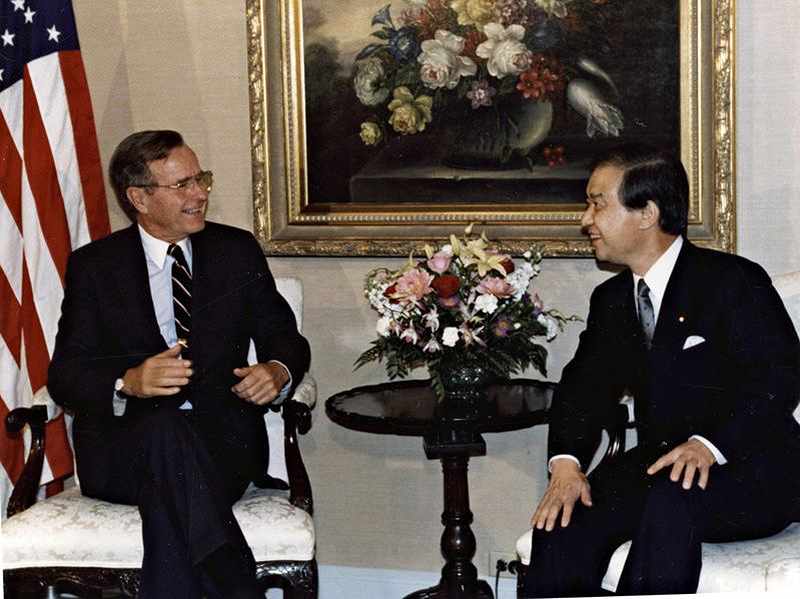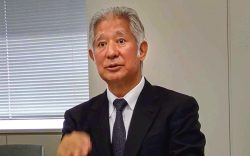Bush demanded Japan send ‘forces’ for 1990 Gulf crisis, declassified documents confirm

Then U.S. President George Bush and then Prime Minister Toshiki Kaifu speak during a summit in New York on Sept. 29, 1990.
19:09 JST, December 22, 2021
In the wake of the Persian Gulf crisis that began in August 1990, then U.S. President George Bush in effect demanded then Prime Minister Toshiki Kaifu to dispatch the Self-Defense Forces, according to diplomatic documents declassified Wednesday.
The documents show Japan was in a difficult position to respond to the international community’s moves prior to the outbreak of the Gulf War in January 1991, when a U.S.-led coalition fought the Gulf War against Iraq.
On Sept. 29, 1990, Kaifu and Bush held a summit in New York.
According to the Foreign Ministry’s diplomatic cable the day after the bilateral talks, Bush told Kaifu he understood Japan was considering ways for its “forces” to participate in international efforts in the Middle East, and such responses by Japan would be beneficial, while acknowledging Japan has constitutional restrictions.
Kaifu replied that he wanted to create a unit to cooperate in a U.N. peacekeeping operation, a proposal that was floated within the Japanese government at that time, though it was never realized.
“We don’t want to help just by contributing funds, but we want to solicit members for the unit from all over Japan to realize cooperation in which we have to break a sweat,” Kaifu said.
However, Kaifu indicated a cautious stance regarding the dispatch of the SDF, saying the Japanese are determined not to use armed force and not to be involved in armed conflict.
“At this moment, I can’t explain any further,” Kaifu told Bush. “But we are putting our efforts into realizing every possible way of non-combat and non-military cooperation.”
Then, in its briefing for the Japanese press corps, the Foreign Ministry did not mention Bush’s de facto demand for the dispatch of “forces.”
Later, some media organizations reported Bush’s mention of “forces.” The ministry then created an internal document stating that it was not a fact that the United States requested the SDF to be dispatched and denied the reports.
It is believed the denial was aimed at easing heated debates in Japan over whether the SDF can be dispatched overseas under the constraints of the Constitution.
During the Gulf crisis, Japan extended financial assistance of $13.5 billion to the multinational coalition, which only led the international community to criticize Tokyo for its checkbook diplomacy.
In response to Iraq’s invasion of Kuwait in August 1990, the U.N. Security Council adopted a resolution that allowed the use of force against Iraq, clearing the way for the U.S.-led coalition to intervene in the Gulf. The crisis evolved into the Gulf War as the U.S.-led multinational force started air raids against Iraq in January 1991, on its way to an overwhelming victory that liberated Kuwait in February.
With the international community increasingly demanding that Japan should contribute personnel, six Maritime Self-Defense Force minesweepers were dispatched to the Persian Gulf in April 1991. Their job was to clear naval mines deployed by Iraq.
The Persian Gulf crisis can be said to be a turning point for Japan’s way of contributing internationally.
“Japanese diplomacy at that time was rather passive, centering on how to respond to U.S. demands,” said former Japanese Ambassador to the United States Kenichiro Sasae, who was serving in the Foreign Ministry’s North American Affairs Bureau at the time of the crisis. “[Japan’s] failure [in the Gulf crisis] became an opportunity for Japan to change its awareness to recognize that proactive use of the SDF is meaningful.”
Top Articles in Politics
-

LDP Wins Historic Landslide Victory
-

LDP Wins Landslide Victory, Secures Single-party Majority; Ruling Coalition with JIP Poised to Secure Over 300 seats (UPDATE 1)
-

Japan Tourism Agency Calls for Strengthening Measures Against Overtourism
-

CRA Leadership Election Will Center on Party Rebuilding; Lower House Defeat Leaves Divisions among Former CDPJ, Komeito Members
-

Voters Using AI to Choose Candidates in Japan’s Upcoming General Election; ChatGPT, Other AI Services Found Providing Incorrect Information
JN ACCESS RANKING
-

Japan Institute to Use Domestic Commercial Optical Lattice Clock to Set Japan Standard Time
-

Israeli Ambassador to Japan Speaks about Japan’s Role in the Reconstruction of Gaza
-

Man Infected with Measles May Have Come in Contact with Many People in Tokyo, Went to Store, Restaurant Around When Symptoms Emerged
-

China Eyes Rare Earth Foothold in Malaysia to Maintain Dominance, Counter Japan, U.S.
-

Australian Woman Dies After Mishap on Ski Lift in Nagano Prefecture























